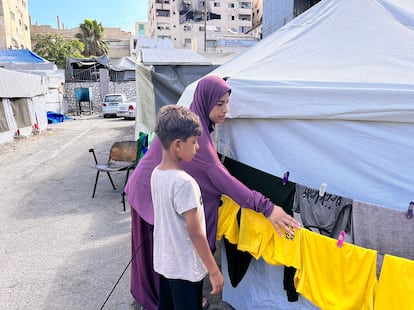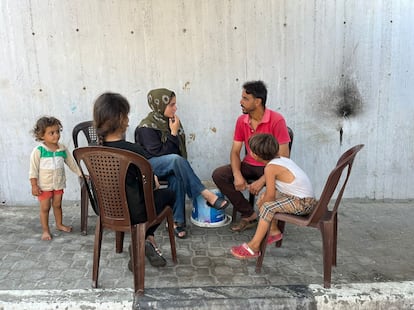The Al Kafarna family, weak and hungry in the face of the Israeli invasion: "We can't walk. We face death in Gaza City."

The fragile body of 35-year-old Sumaya al-Kafarna, sitting in front of her makeshift tent in Gaza City, embodies the hunger that has consumed the Palestinian territory for months . This mother of five has lost more than half her weight—from 75 to 35 kilos—while battling breast cancer, without access to treatment and after being forced to move more than 20 times since the start of the Israeli offensive almost two years ago. “I feel pain day and night,” she says, her voice barely above a whisper. “With the hunger and the displacement, my suffering has doubled. Caring for my children is like carrying mountains.”
The Israeli takeover of Gaza City, which Benjamin Netanyahu's government has announced as imminent, will force them to flee once again. "We're waiting for our deaths. They're asking us to leave. How? Where? We can't walk to central or western Gaza, and we can't afford transportation," says this woman, emphasizing that there are hardly any reasonably safe places in the Strip to set up a tent, and transportation is scarce and unaffordable. "We'll stay here until the bombs fall," she concludes.
Sumaya says the news of the invasion and occupation of Gaza City has exhausted her mentally more than hunger. “I had a nervous breakdown when I heard the news. I thought about how I would flee while starving, sick, unable to walk, and with nowhere to go.”
Sumaya's story reflects the tragedy following the United Nations' famine declaration issued this Friday , the first outside Africa since the creation of the modern classification system in 2004. According to the Rome-based Integrated Food Security Classification (IPC), some 514,000 people—almost a quarter of Gaza's population—are facing famine. The famine is expected to worsen and spread southward, affecting a total of 641,000 people by the end of September.
The Gaza Health Ministry reported on Saturday that eight people, including two children, died of malnutrition in the past 24 hours, bringing the total number of hunger-related deaths to 281 since the start of the conflict, 114 of whom were children. In total, more than 62,000 residents of the Strip have died violently in this war, which broke out in October 2023, according to figures from the Gaza Health Ministry, which the UN uses as a reference.
The announcement of these deaths coincides with the Israeli government's plans to launch a new offensive on Gaza City, for which it has ordered the mobilization of 60,000 reservists. Humanitarian organizations fear the operation will further exacerbate the crisis.
For the Al Kafarna family, trapped in this territory whose borders have been sealed for more than 22 months, the prospect of being forced to move again terrifies them. Sumaya's husband was wounded in the foot on the first day of the war and was shot in the hand during a temporary ceasefire when he went to visit his destroyed home. Their health prevents them from walking long distances. "There are no safe places in the central part of the Strip. The price of moving is too high," she explains. "My husband and I cannot walk long distances because of our health, which means we face death in Gaza City."

For the inhabitants of the Strip, these forced flights have become a tragedy as cruel as famine. UN Secretary-General António Guterres described the extreme situation of the Gazans as a "failure of humanity." He also emphasized that famine is not just a shortage of food, but "the deliberate collapse of the systems necessary for human survival."
“The table is empty”For Philippe Lazzarini, Commissioner-General of UNRWA, the UN Agency for Palestinian Refugees, this famine was "engineered and man-made, by the Israeli government." Meanwhile, Tom Fletcher, the UN humanitarian chief, was more forceful: "Food is not reaching those who need it because of Israel's systematic obstruction." But Israeli Prime Minister Benjamin Netanyahu flatly rejected the accusations and called the report "an absolute lie," asserting that "Israel does not pursue a famine policy."
Tawfiq Abu Jarad, a 45-year-old professor and father of five, has gone from teaching at the university to living as a displaced person in a tent after the army destroyed his home in Beit Lahia, in the northern Gaza Strip. Since March, his family hasn't eaten a full meal. "We only find a few vegetables. There's no meat, no fruit, no protein. The table is empty, and our bodies are getting weaker every day," he says, after losing 22 kilos. His children suffer from skin diseases and other ailments caused by malnutrition.
Her family's odyssey has included multiple displacements throughout the Strip and is just a glimpse into what hundreds of thousands of people in Gaza suffer. The family moved from the Jabalia refugee camp in the north to Rafah in the south, passing through Khan Yunis and Al Mawasi, and finally returned to their destroyed village, only to be forced to flee again under bombardment. "The UN declaration gave us a sliver of hope, but we know it won't change the reality. Every day, children and women die of hunger," she laments.

“When the United Nations announced that Gaza had entered a state of famine, we hoped the world would react,” Abu Jarad says with a tone of despair. “But deep down, we know that this decision won't change reality.”
Her 12-year-old daughter was shot in the back in March during an Israeli operation, and her cousins were killed in the same attack. Since then, they haven't been able to take her to a hospital. "Malnutrition has hampered her recovery," she explains.
Evacuating Gaza City in the face of a possible Israeli army invasion is now almost unimaginable for Abu Jarad and his family. “Moving again, even to the center of the Strip, is exorbitantly expensive; maybe $1,000,” he says. “If I had that money, maybe I would leave, but there’s nowhere to find it. If I had that money, I would feed my children first,” he adds.
A symbolic decisionFamine has so far been declared in Gaza City and the surrounding area, approximately one-fifth of the 365-square-kilometer territory. However, projections predict that Deir el-Balah and Yan Yunis, further south, will also enter the famine phase before the end of September. Furthermore, CPI figures project an increase in the number of people facing famine in other areas if immediate access to food, medicine, and basic services is not guaranteed.
The crisis has been exacerbated by controversial changes in aid distribution. Since May, the Gaza Humanitarian Fund—backed by Israel and the US—has taken over food distribution, replacing UN agencies. According to the UN , from late May to mid-August, at least 1,857 Palestinians have died while trying to obtain food, 1,021 of them in the vicinity of the distribution points of this controversial fund.
The UN statement has revived calls for an urgent international response. International law experts point out that, as an occupied territory, Israel has legal responsibilities under the Fourth Geneva Convention, including the duty to ensure the civilian population's access to food and medical care.
Lawyer and human rights defender Abdullah Sharsharah argues that the classification of Gaza as a famine zone is not only a humanitarian crisis, but also legal evidence of a potential war crime, as Article 54 of the Geneva Protocol prohibits the use of starvation as a weapon and Article 8 of the Rome Statute prohibits deliberately depriving civilians of materials necessary for survival.
For Sumaya, the UN announcement evokes a bittersweet feeling. “I felt happy for a moment because someone recognized our suffering. But my sadness is greater. The decision is symbolic: hunger continues to devour our bodies.”
EL PAÍS





